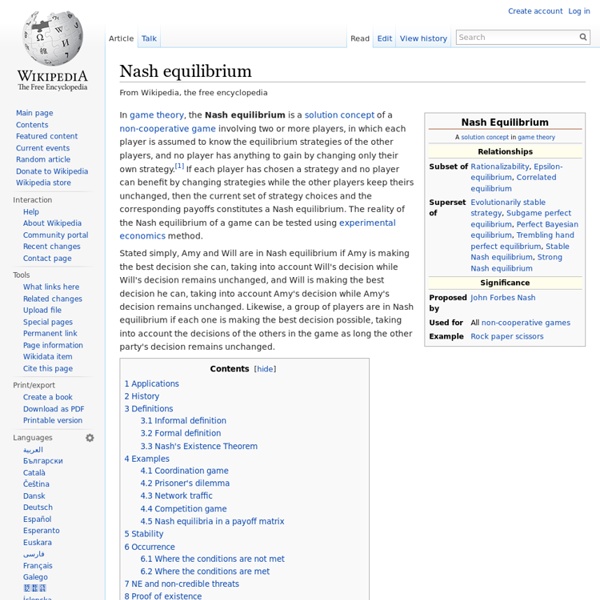Nash equilibrium

Economics in Excel - Microeconomics Principles
Principles of Microeconomics: Study Guide Excel-based counterparts to all graphs in the chapters of Gwartney, Stroup, Sobel, and Macpherson Economics may be accessed below. For each chapter we provide an Excel workbook and a set of questions to guide users through the worksheets. The study guides are Word documents. The links to the individual workbooks and associated assignment sheets follow the chapter overviews below. Click on the chapter number here to move to the relevant part of this page: 1341718202324252627. A similar set of exercises based on chapters from Mankiw, Economics, is available here. Chapter 1. This material follows the text quite closely, using Excel workbooks to illustrate the graphical analysis that the text develops. Chapter 3. The Study Guide covers three related topics: Demand, Supply, and Market Equilibrium. This workbook examines demand. This workbook examines supply. This workbook examines market equilibrium. Chapter 4. Chapter 5. Chapter 17. Chapter 18.
The Online Books Page: Archives and Indexes
General -- Non-English Language -- Specialty There's a vast range of online literature beyond what we index individually on The Online Books Page. Below we list some of the major sources and indexes of free online texts, in all languages, both general and specialized. General These are large, general-purpose collections with substantial English-language listings. Large-scale repositories -- Significant indexes and search aids -- Significant smaller-scale archives Large-scale repositories These are big collections of texts, big enough to act as small library-like collections in their own right. Significant indexes and search aids The sites below primarily provide search engines, indexes or useful link lists for finding online books. Significant smaller-scale archives Everything else we see worth listing that doesn't fit in more specialized categories. Non-English Languages Tyler Jones's iLoveLanguages site has a comprehensive listing of various language and literature resources. Agriculture Audio
Simplicity
First published Fri Oct 29, 2004; substantive revision Thu Feb 25, 2010 Most philosophers believe that, other things being equal, simpler theories are better. But what exactly does theoretical simplicity amount to? Syntactic simplicity, or elegance, measures the number and conciseness of the theory's basic principles. Ontological simplicity, or parsimony, measures the number of kinds of entities postulated by the theory. 1. There is a widespread philosophical presumption that simplicity is a theoretical virtue. We may assume the superiority ceteris paribus of the demonstration which derives from fewer postulates or hypotheses.[1] Moving to the medieval period, Aquinas writes If a thing can be done adequately by means of one, it is superfluous to do it by means of several; for we observe that nature does not employ two instruments where one suffices (Aquinas 1945, p. 129). Compare this to the following passage from Einstein, writing 150 years later. (i) How is simplicity to be defined? 2.
Related:
Related:



